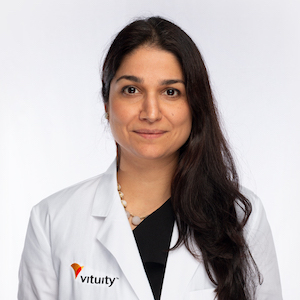Why focus on service excellence during a pandemic? As a director of patient experience, it’s a question I’ve asked myself countless times over the past two years.
Throughout this prolonged disaster, I’ve watched my hospitalist colleagues work grueling back-to-back shifts, craft PPE from duct tape and trash bags, hold iPads so dying patients could say farewell to their loved ones, and then rush home to homeschool their kids. When one of my hospitalist colleagues fell sick with COVID-19, he ran his entire department virtually from his sickbed. Under these exigencies, maybe we should give clinicians a pass when it comes to “soft” skills like empathy and communication.
Or should we? What if a pandemic is an ideal—indeed, crucial—time to focus on serving and connecting with patients? Research shows that focusing on human connection pays dividends in the form of clinician satisfaction and team morale. The more tools our clinicians have to support patients, the more worthwhile our careers feel on a day-to-day basis. Patient experience also correlates with improved clinical outcomes, medication adherence, and quality measures like readmissions—making it a win for hospitals as well as patients and care teams.
At Vituity, we approach learning and transformation a little differently. As physicians and advanced providers with extensive training, we all know how to learn and improve our clinical practice. My job is to bring people together to learn from each other. A robust body of evidence suggests that this practice (known as collaborative learning) drives rapid performance improvement. That’s why each year, I lead a patient experience collaborative program. Here’s how this initiative benefits our patients, clinicians, and hospitals.
How We Support Patient Experience
Our patient experience (PX) collaborative is ideal for hospitalist teams with a firm foundation of quality, collaboration, and clinician satisfaction. We kick things off with a virtual boot camp that brings together nursing and medical directors from each participating department. During the event, we present a variety of evidence-based interventions shown to improve patient experience. Most of all, we try to send the message that seemingly simple interventions can have a huge impact. In the words of one medical director, “The collaborative gave us concrete tools that not only improved patient experience scores but were also incredibly helpful for our own wellness. When I connect with my patients, I feel happier and less stressed during my shifts.”
Team leaders then draw up action plans with the help of our faculty. Common interventions for hospital medicine departments include patient care cards, patient callbacks, and leadership rounding. Participants often remark on the ease of this process. “The workbook we received had important insights and advised us on how to roll out our initiatives—all of which was incredibly helpful,” said one hospitalist nursing director. “This collaborative has made me into a true believer of the importance of patient experience programs.”
Next, the participating care teams (including clinicians, nurses, scribes, and hospital administrators) attend a virtual communication skills workshop. We start by reviewing what patients want from their caregivers. Number one is to be heard—even before feeling respected. With this in mind, teams learn and practice a variety of communication frameworks, including Aidet, Pearls, and my own 6H model for forging an authentic connection with our patients.
Over the next four months, teams execute their action plans. Each clinical practice has a dedicated team that supports participants with coaching calls and site visits. Finally, at the end of the program, everyone meets for a wrap-up event to share accomplishments and lessons learned.
In 2021, we offered the entire collaborative virtually to ensure safety and respect participant time. In addition, each participant had the opportunity to earn up to 11.5 CME credits across the four-month program.
Wins for Collaborative Learning Among Hospitalists
The 2021 PX collaboratives were successes on several levels. Throughout the program, we surveyed participants about their experiences. Their feedback:
- 100% said the boot camp was well worth their time.
- 95% gave the collaborative an overall high rating.
- 90% said participating in the collaborative improved their patient satisfaction experience and performance.
At our wrap-up events, team leaders shared wins and lessons learned. Ahmed Rez, MD, hospitalist medical director at SSM Health St. Clare (Missouri), told the story of a COVID-positive patient who was discharged home. Because the patient was taking blood thinners, they required regular monitoring through blood work. However, their usual providers refused to see them while they were COVID positive. Because the team had initiated a callback program, they uncovered the problem within 24 hours and worked with case management to connect the patient with a home health service to perform the necessary labs. Because this patient didn’t have a strong medical advocate at home, this intervention was potentially lifesaving—and represented a very satisfying “win” for the team.
Chris Valencia, DO, hospitalist patient experience champion at Mercy Medical Center Redding (California), shared a heartfelt initiative his department launched during the collaborative. Each time the team lost a patient, they had a tree planted in the person’s honor in a U.S. national forest. The team then sent the patient’s family a condolence card with details about this living tribute. This simple gesture warmed the hearts of grieving families—and inspired many collaborative participants to memorialize patients in meaningful ways.
Calling All Clinician Innovators
Collaborative learning is just one way Vituity supports front-line innovation. With alternative care models such as hospital at home and tele-rounding, we’re focused on empowering hospitalist teams to challenge the status quo and seek out new solutions that better serve patients and clinicians. If you’re a hospitalist looking to make a difference in your practice, our culture of provider engagement and empowerment might be the fit you’re looking for.
Learn more about furthering your hospitalist career at Vituity.























